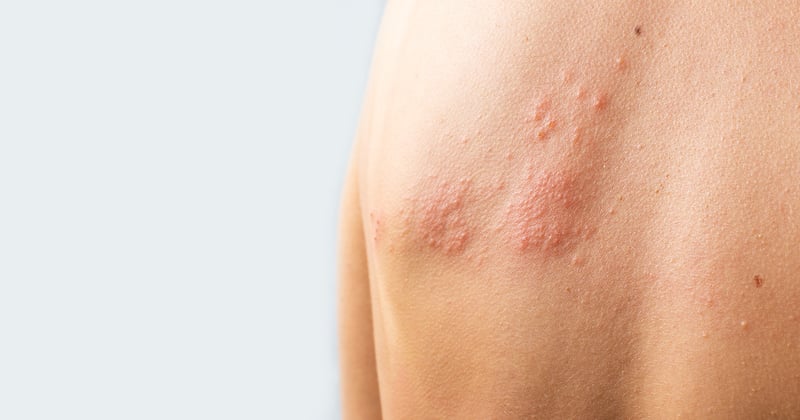

Shingles
in Ames, IA
What Causes Shingles?
Shingles is a nerve infection that triggers a painful rash on your skin. A shingles rash can appear anywhere, but typically appears on only one side of your face or body. The rash consists of small blisters that typically scab over in 7-10 days. Most shingles rashes clear up in a few weeks, but the pain can continue for months or even years.
Shingles is caused by varicella zoster virus (VZV), also known as the chickenpox virus. After someone has chickenpox – like most children did prior to the chicken pox vaccine – the virus lies dormant in certain nerves for decades. When the virus reactivates without warning, shingles can occur.
REQUEST NOWWho’s At Risk of Getting Shingles?
Shingles is more common in people over the age of 50. People with medical conditions that stop their immune systems from working properly (such as HIV/AIDS and certain cancers like leukemia or lymphoma) also have a greater risk of getting shingles.
Is Shingles Contagious?
If you have a shingles rash, any direct contact with the fluid from your blisters can spread VZV to people who never had chickenpox or received the vaccine. If they get infected, they will develop chickenpox, not shingles. However, they could develop shingles later in life.
To prevent spreading VZV to others, be sure to keep your shingles rash covered while it heals. People with shingles cannot spread the virus before their blisters appear or after they crust over.
What Are Shingles Symptoms?
Before the telltale shingles rash appears, you may experience pain, sensitivity, tingling, or itching in the area where it will develop. This can happen several days before you see the first sign of a rash.
Usually, the rash is a single stripe around the left or right side of your face or body. In rare cases, the rash may be more widespread and look similar to a chickenpox rash (especially in people with weakened immune systems). The rash begins as small, red spots and turns into blisters in a matter of days.
Other early symptoms of shingles include:
• Feeling ill
• Upset stomach
• Fever
• Chills
• Headache
The symptoms of shingles may look like other medical conditions at first. Contact Forefront Dermatology today for a prompt diagnosis.
How Is Shingles Diagnosed?
Your Forefront dermatologist will likely know right away if you have shingles based on the unique appearance of your rash. They will also ask about your medical history, specifically if you’ve ever had chickenpox. If necessary, we can scrape a tiny bit of fluid from a blister and check if it contains the virus.
How Do We Treat Shingles?
There is no cure for shingles, so treatment focuses primarily on pain relief. We often prescribe one of three antiviral medications (acyclovir, famciclovir, or valacyclovir) for shingles pain treatment. These medications can:
• Decrease your symptoms and how severe the rash becomes
• Reduce the amount of time that you have a shingles rash
• Lower your risk of long-term nerve damage
Other treatments for shingles include:
• Creams or lotions to relieve itching
• Corticosteroids to reduce inflammation
Applying a cold compress or using calamine lotion on the affected skin area can also help as the virus runs its course.
Are There Any Shingles Complications?
Long-term nerve pain is the most common complication of shingles, affecting 10-18% of people. Your risk of long-term nerve pain after having shingles increases with age. For some, the pain can be so severe and debilitating that it interferes with their daily life.
A bacterial infection of the skin where the rash happens is another potential complication. If the rash is near the eyes or eyelids, infection can lead to temporary or permanent blindness. Infection can also cause tissue death and scarring. Ask your Forefront dermatologist how to avoid shingles complications that involve your skin.
Can You Get Shingles More Than Once?
Most people only get shingles once, but you can get it again.
How Do You Prevent Getting Shingles?
There are two vaccines available to prevent shingles – ask your doctor which vaccine is best for you. Health experts recommend vaccination for all adults 50 and older, even if you’ve had shingles before.
Time to Call for Treatment?
If you think you have shingles, call your Forefront dermatologist right away so we can begin treatment and lessen your pain. Find a Forefront Dermatology office near you and schedule a consultation today.
Feeling the pain of shingles? Book a consultation with a skin specialist today.
1 Location in the Ames, IA area
Interested in Shingles? Request a consultation with a skin specialist today.
*Treatment options may vary at each location.Please confirm your desired treatment is offered at your preferred location when scheduling. *Age Restriction.
For patients scheduling who are under 18 years of age (19 in Alabama and Nebraska) please make sure you have permission from your parent or legal guardian to schedule this appointment. Your parent or legal guardian must accompany you on your initial visit and on certain subsequent visits to provide appropriate informed consent.